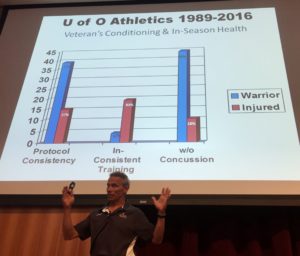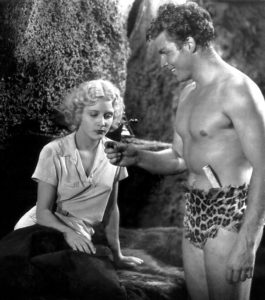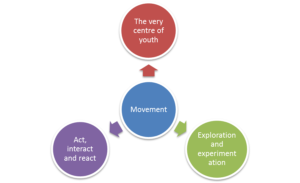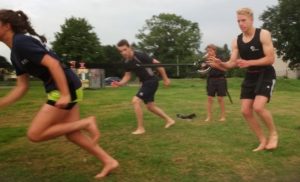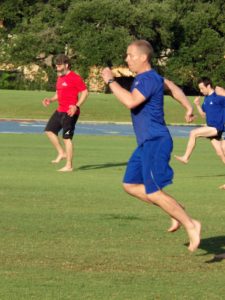Main Menu
Latest Blog Entry
User login
Developing the Robust Athlete: Jim Radcliffe
“Some people can negotiate the speed bumps of life, some end up in a ditch.”
Jim Radcliffe talking about the Robust Athlete in his excellent presentation at GAIN this year.
Jim has coached at The University of Oregon since 1989 and has been a major influence on my coaching since 2011 when I first saw him present. His philosophy as developed over his time working with his athletes and his results reflect that.
He started off by looking at the mindset of the athletes using the analogy of the Romans at the fall of their empire forgetting what made them strong in the first place.
Post Marcus Aurelius, their emperors became weaker and “bread and circuses” and “orgies” undermined the character of the citizens.
Meanwhile the Visigoths were waiting to cross the Rhine and take advantage of the weakened states in the empire.
He also likened developing athletes to the brutalities of the jungle in which Tarzan grew up and became strong, compared to Jane who was ill prepared to cope.
Musculo –skeletal 101
Jim has previously outlined the decline in the musculo-skeletal health of the athletes entering college now compared to when he started in 1989.
These include:
- Higher sedentary lifestyle
- Poor nutrition
- Improper running techniques
- Less physical education (less play in the backyard too)
- A high competitive age versus an infantile training age
The coaching programme has to adjust accordingly and hope to rectify these problems.
(This information and my own experiences have massively influenced what we do at Excelsior ADC and why I set the club up).
Jim quoted from a 1971 study on the need to be physically educated stating that movement is
“The Primary vehicle by which exploration and experimentation can expand knowledge of oneself.”
Regaining the Rhythm
Jim stated the need for some sociological orchestration to facilitate more free play. Young people need to practice “surfing through the chaos”. How else do they find their own rhythm?
The art of coaching is now how to make something structured (like sports club) more like play?
(It isn’t, as one academic recently tweeted, to “conduct drills in a playful manner”).
Jim is now working with many middle distance runners and in his sessions he tries to get them to find rhythm in running and also disrupted rhythm: the race is rarely even- paced.
He referred to the Jamaican sprinters who still want to train on a grass track: does it help them with rhythm when sprinting?
More is Better!
“If I keep adding strength coaches, what do we do more of? Strength coaching.”
Jim said that we are currently in an age of adding more to things. Helicopter parenting is part of the problem (refer back to Overspecialisation blog and free play).
We tend to overdo things in an effort to get ahead of the curve.
We OVER:
- Coach
- Train
- Analyse
- Treat
- Nutrienting
- Medicating
- Restorating
Is any of this helping our athletes become more robust? Before using any of the restoration and medical interventions we have to know WHY we are doing it.
From (recovery) versus For (preparing)
Each intervention is situation and athlete specific.
Jim says that overhydration is becoming a problem. We have an “innate thirst mechanism” which we should recognise. He said that most muscular cramps are associated with neuromuscular fatigue rather than dehydration.
He follows a 4 ‘R’s approach to recovery:
- Replace fluids and electrolytes (includes fruit and veg)
- Replenish glycogen
- Rebuild muscle protein
- Reduce oxidative stress (again with the fruit and veg!)
(This is similar to the 3 stage approach to nutrition we use adapted from Dave Ellis which starts with fresh produce).
Massage: what is it good for?
In a study of 30 Olympians, it was found that the medallists used massage less than non-medallists. Has it become a crutch for some?
(I personally have found that it is overused, and that is linked to funding streams with equal amounts being allocated to training and “medical”. The athletes then use it or lose it, meaning they are spending as much time on the massage table as they are doing fitness training).
Jim was also critical of cold water immersion: he has found his athletes adapt to it quickly and it restricts blood flow. Jim quoted from Bill Knowles that “movement is medicine” and said that active recovery methods have worked better for his athletes.
Jim finished with a thought that athletes have to be given the opportunity to “figure it out”. He creates some “agility through adversity” sessions.
This seminar was an excellent example of a coach using the scientific method to establish what works best for his athletes. It is experience based practice and has been refined over 28 years in one environment (not many “scientific” studies last for 28 weeks!)
My only gripe is that we had limited practical time with Jim at this GAIN, we did plyometric progressions one morning with him, but I always want to learn more!
Further reading:
- Coaches guide to planning the year: Wade Gilbert
- Next Up: creating the perfect workout Jim Radcliffe & Vern Gambetta
Client Testimonials
 Blundells School
Blundells School
James has a huge breath and depth of knowledge on fitness issues. He is able to implement this knowledge into a practical course both making the task of fitness and conditioning both different and interesting from other fitness training that most are familiar with. He understands the safety issues when dealing with young adults strength and conditioning programmes. Programmes he sets are tailored to the individual needs of the group. There was a huge amount of progress made with some of these individuals in terms of their understanding of fitness and their own fitness levels.
More


